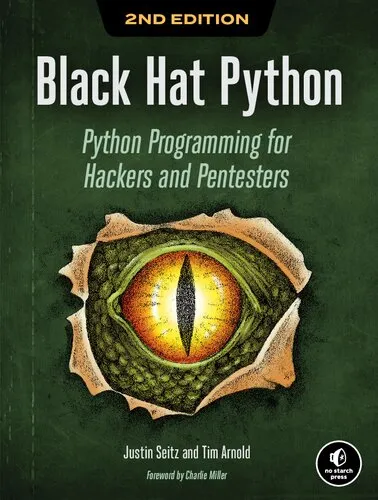Black Hat Python: Python Programming for Hackers and Pentesters
4.7
Reviews from our users

You Can Ask your questions from this book's AI after Login
Each download or ask from book AI costs 2 points. To earn more free points, please visit the Points Guide Page and complete some valuable actions.Introduction to "Black Hat Python: Python Programming for Hackers and Pentesters"
"Black Hat Python: Python Programming for Hackers and Pentesters" is a revolutionary book that explores the boundaries of what Python can achieve in the realm of hacking, cybersecurity, and penetration testing. Written by Justin Seitz with contributions from Tim Arnold, this book takes readers through the intricacies of offensive programming, delving into the tools, techniques, and methodologies that hackers use to penetrate systems and fortify defenses.
Detailed Summary
At its core, "Black Hat Python" is a guide tailored for those who want to understand how attackers think, build their tools, and exploit vulnerabilities—all using Python. This book is unapologetically focused on the offensive side of security, illuminating not only what happens when systems are attacked but also why it happens. Readers are introduced to complex concepts in networking, cryptography, and malware development, presented in a way that combines educational depth with practical application.
Starting with basic concepts like network sniffing and packet manipulation, the book quickly dives into more advanced topics, such as creating tools for testing intrusion detection systems, automating malware with Python, and capturing credentials invisibly. It also includes sections on web application exploitation, data exfiltration, and leveraging Python for interacting with third-party libraries and APIs, all designed to give readers hands-on experience in wielding Python for cybersecurity purposes.
The book doesn’t assume readers have extensive programming knowledge but guides them step-by-step, making sure they grasp the practical implementations of code in real-world scenarios. All the code presented in the book is designed to be modular and fully functional, allowing readers to test, modify, and build upon the ideas presented. Because of this, "Black Hat Python" uniquely bridges the gap between theoretical hacking concepts and actionable tools for penetration testing.
Key Takeaways
- Learn how to use Python to create network reconnaissance tools and exploit vulnerabilities.
- Understand offensive techniques used by hackers and how they apply to penetration testing.
- Develop custom modules to interact with APIs, perform privilege escalation, and automate attacks.
- Explore concepts such as keylogging, credential stealing, and cryptography from a hacker’s perspective.
- Master Python’s ability to integrate with third-party libraries for malware construction and reverse engineering.
- Enhance your skills in conducting security assessments and improving system hardening measures.
Famous Quotes from the Book
"In the world of cybersecurity, understanding the tools of the trade is no longer optional—it’s essential."
"Python isn’t just a language for data scientists or web developers; it’s a framework for creativity, discovery, and deconstruction in cybersecurity."
"Every system has vulnerabilities, and every vulnerability is a lesson in human ingenuity."
Why This Book Matters
"Black Hat Python" represents a critical pivot in cybersecurity training by focusing on offensive security rather than defensive measures alone. The authors challenge the conventional perspective that learning to hack is ethically ambiguous, emphasizing that understanding how an attacker works is the key to building resilient systems. This mindset shift has made the book an essential resource for security professionals, ethical hackers, and penetration testers worldwide.
This book matters because it fills an important niche: introducing readers to hacking techniques in a controlled, educational environment. It empowers cybersecurity enthusiasts not only to defend systems but also to anticipate and counteract attacks creatively. By focusing on Python—a language known for its simplicity and versatility—the authors demonstrate that hacking doesn’t always require complex tools; sometimes, it’s just a matter of wielding the right programming framework effectively.
Whether you’re a professional penetration tester or a newcomer exploring cybersecurity, "Black Hat Python" gives you the tools to think critically, act decisively, and understand your adversaries better. It strengthens the cybersecurity ecosystem by fostering skills that contribute to innovation, resilience, and ultimately, the creation of more secure digital environments.
Free Direct Download
You Can Download this book after Login
Accessing books through legal platforms and public libraries not only supports the rights of authors and publishers but also contributes to the sustainability of reading culture. Before downloading, please take a moment to consider these options.
Find this book on other platforms:
WorldCat helps you find books in libraries worldwide.
See ratings, reviews, and discussions on Goodreads.
Find and buy rare or used books on AbeBooks.
1095
بازدید4.7
امتیاز50
نظر98%
رضایتReviews:
4.7
Based on 0 users review
"کیفیت چاپ عالی بود، خیلی راضیام"


